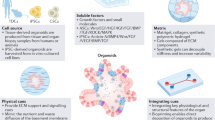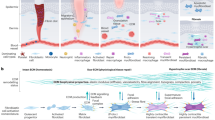Abstract
Transforming growth factor-β (TGF-β) is overexpressed at sites of wound repair and in most adenocarcinomas including prostate cancer. In stromal tissues, TGF-β regulates cell proliferation, phenotype and matrix synthesis. To address mechanisms of TGF-β action in cancer-associated reactive stroma, we developed prostate stromal cells null for TGF-β receptor II (TβRII) or engineered to express a dominant-negative Smad3 to attenuate TGF-β signaling. The differential reactive stroma (DRS) xenograft model was used to evaluate altered stromal TGF-β signaling on LNCaP tumor progression. LNCaP xenograft tumors constructed with TβRII null or dominant-negative Smad3 stromal cells exhibited a significant reduction in mass and microvessel density relative to controls. Additionally, decreased cellular fibroblast growth factor-2 (FGF-2) immunostaining was associated with attenuated TGF-β signaling in stroma. In vitro, TGF-β stimulated stromal FGF-2 expression and release. However, stromal cells with attenuated TGF-β signaling were refractory to TGF-β-stimulated FGF-2 expression and release. Re-expression of FGF-2 in these stromal cells in DRS xenografts resulted in restored tumor mass and microvessel density. In summary, these data show that TGF-β signaling in reactive stroma is angiogenic and tumor promoting and that this effect is mediated in part through a TβRII/Smad3-dependent upregulation of FGF-2 expression and release.
This is a preview of subscription content, access via your institution
Access options
Subscribe to this journal
Receive 50 print issues and online access
$259.00 per year
only $5.18 per issue
Buy this article
- Purchase on Springer Link
- Instant access to full article PDF
Prices may be subject to local taxes which are calculated during checkout







Similar content being viewed by others
References
Akhurst RJ, Derynck R . (2001). TGF-beta signaling in cancer—a double-edged sword. Trends Cell Biol 11: S44–S51.
Backhaus R, Zehe C, Wegehingel S, Kehlenbach A, Schwappach B, Nickel W . (2004). Unconventional protein secretion: membrane translocation of FGF-2 does not require protein unfolding. J Cell Sci 117: 1727–1736.
Bhowmick NA, Chytil A, Plieth D, Gorska AE, Dumont N, Shappell S et al. (2004). TGF-beta signaling in fibroblasts modulates the oncogenic potential of adjacent epithelia. Science 303: 848–851.
Bonniaud P, Kolb M, Galt T, Robertson J, Robbins C, Stampfli M et al. (2004). Smad3 null mice develop airspace enlargement and are resistant to TGF-beta-mediated pulmonary fibrosis. J Immunol 173: 2099–2108.
Butter S, Laping NJ, Pullen M, Grygielko E, Olson B, Brooks DP . (2001). The role of transforming growth factor-beta and its receptors in human prostate smooth muscle cell fibronectin production. Eur J Pharmacol 422: 47–52.
Cheng N, Bhowmick NA, Chytil A, Gorksa AE, Brown KA, Muraoka R et al. (2005). Loss of TGF-beta type II receptor in fibroblasts promotes mammary carcinoma growth and invasion through upregulation of TGF-alpha-, MSP- and HGF-mediated signaling networks. Oncogene 24: 5053–5068.
Choy L, Skillington J, Derynck R . (2000). Roles of autocrine TGF-beta receptor and Smad signaling in adipocyte differentiation. J Cell Biol 149: 667–682.
Coffey Jr RJ, Shipley GD, Moses HL . (1986). Production of transforming growth factors by human colon cancer lines. Cancer Res 46: 1164–1169.
Derynck R, Zhang YE . (2003). Smad-dependent and Smad-independent pathways in TGF-beta family signalling. Nature 425: 577–584.
Desmouliere A, Geinoz A, Gabbiani F, Gabbiani G . (1993). Transforming growth factor-beta 1 induces alpha-smooth muscle actin expression in granulation tissue myofibroblasts and in quiescent and growing cultured fibroblasts. J Cell Biol 122: 103–111.
Dow JK, deVere White RW . (2000). Fibroblast growth factor 2: its structure and property, paracrine function, tumor angiogenesis, and prostate-related mitogenic and oncogenic functions. Urology 55: 800–806.
Dvorak HF . (1986). Tumors: wounds that do not heal. Similarities between tumor stroma generation and wound healing. New Engl J Med 315: 1650–1659.
Eastham JA, Truong LD, Rogers E, Kattan M, Flanders KC, Scardino PT et al. (1995). Transforming growth factor-beta 1: comparative immunohistochemical localization in human primary and metastatic prostate cancer. Lab Invest 73: 628–635.
Fukabori Y, Nakano K, Ohyama A, Yamanaka H . (1997). Stimulative effect of transforming growth factor-beta on collagen synthesis by human prostatic stromal cells in vitro. Int J Urol 4: 597–602.
Giri D, Ropiquet F, Ittmann M . (1999). Alterations in expression of basic fibroblast growth factor (FGF) 2 and its receptor FGFR-1 in human prostate cancer. Clin Cancer Res 5: 1063–1071.
Hayashi T, Hideshima T, Nguyen AN, Munoz O, Podar K, Hamasaki M et al. (2004). Transforming growth factor beta receptor I kinase inhibitor down-regulates cytokine secretion and multiple myeloma cell growth in the bone marrow microenvironment. Clin Cancer Res 10: 7540–7546.
Huss WJ, Barrios RJ, Foster BA, Greenberg NM . (2003). Differential expression of specific FGF ligand and receptor isoforms during angiogenesis associated with prostate cancer progression. Prostate 54: 8–16.
Igarashi A, Okochi H, Bradham DM, Grotendorst GR . (1993). Regulation of connective tissue growth factor gene expression in human skin fibroblasts and during wound repair. Mol Biol Cell 4: 637–645.
Lakos G, Takagawa S, Chen SJ, Ferreira AM, Han G, Masuda K et al. (2004). Targeted disruption of TGF-beta/Smad3 signaling modulates skin fibrosis in a mouse model of scleroderma. Am J Pathol 165: 203–217.
Liotta LA, Kohn EC . (2001). The microenvironment of the tumour–host interface. Nature 411: 375–379.
Peehl DM, Sellers RG . (1998). Basic FGF, EGF, and PDGF modify TGFbeta-induction of smooth muscle cell phenotype in human prostatic stromal cells. Prostate 35: 125–134.
Pertovaara L, Kaipainen A, Mustonen T, Orpana A, Ferrara N, Saksela O et al. (1994). Vascular endothelial growth factor is induced in response to transforming growth factor-beta in fibroblastic and epithelial cells. J Biol Chem 269: 6271–6274.
Polnaszek N, Kwabi-Addo B, Peterson LE, Ozen M, Greenberg NM, Ortega S et al. (2003). Fibroblast growth factor 2 promotes tumor progression in an autochthonous mouse model of prostate cancer. Cancer Res 63: 5754–5760.
Roberts AB, Russo A, Felici A, Flanders KC . (2003). Smad3: a key player in pathogenetic mechanisms dependent on TGF-beta. Ann NY Acad Sci 995: 1–10.
Roberts AB, Sporn MB . (1996). Transforming growth factor-β. In: Clark RAF (ed). The Molecular and Cellular Biology of Wound Repair. Plenum Press: New York, NY, pp 275–308.
Roberts AB, Sporn MB, Assoian RK, Smith JM, Roche NS, Wakefield LM et al. (1986). Transforming growth factor type beta: rapid induction of fibrosis and angiogenesis in vivo and stimulation of collagen formation in vitro. Proc Natl Acad Sci USA 83: 4167–4171.
Ronnov-Jessen L, Petersen OW, Bissell MJ . (1996). Cellular changes involved in conversion of normal to malignant breast: importance of the stromal reaction. Physiol Rev 76: 69–125.
Rowley DR . (2007). Reactive stroma and evolution of tumors: integration of transforming growth factor-beta, connective tissue growth factor, and fibroblast growth factor-2 activities. In: Jakowlew S (ed). Transforming Growth Factor-Beta in Cancer Therapy. Humana Press: Towta.
Sakko AJ, Ricciardelli C, Mayne K, Tilley WD, Lebaron RG, Horsfall DJ . (2001). Versican accumulation in human prostatic fibroblast cultures is enhanced by prostate cancer cell-derived transforming growth factor beta1. Cancer Res 61: 926–930.
Silver DP, Livingston DM . (2001). Self-excising retroviral vectors encoding the Cre recombinase overcome Cre-mediated cellular toxicity. Mol Cell 8: 233–243.
Story MT, Hopp KA, Meier DA . (1996). Regulation of basic fibroblast growth factor expression by transforming growth factor beta in cultured human prostate stromal cells. Prostate 28: 219–226.
Tuxhorn JA, Ayala GE, Rowley DR . (2001). Reactive stroma in prostate cancer progression. J Urol 166: 2472–2483.
Tuxhorn JA, Ayala GE, Smith MJ, Smith VC, Dang TD, Rowley DR . (2002a). Reactive stroma in human prostate cancer: induction of myofibroblast phenotype and extracellular matrix remodeling. Clin Cancer Res 8: 2912–2923.
Tuxhorn JA, McAlhany SJ, Dang TD, Ayala GE, Rowley DR . (2002b). Stromal cells promote angiogenesis and growth of human prostate tumors in a differential reactive stroma (DRS) xenograft model. Cancer Res 62: 3298–3307.
Tuxhorn JA, McAlhany SJ, Yang F, Dang TD, Rowley DR . (2002c). Inhibition of TGF-β activity decreases angiogenesis in a human prostate cancer reactive stroma xenograft model. Cancer Res 62: 6021–6025.
Uchiyama-Tanaka Y, Matsubara H, Mori Y, Kosaki A, Kishimoto N, Amano K et al. (2002). Involvement of HB-EGF and EGF receptor transactivation in TGF-beta-mediated fibronectin expression in mesangial cells. Kidney Int 62: 799–808.
Yang F, Tuxhorn JA, Ressler SJ, McAlhany SJ, Dang TD, Rowley DR . (2005). Stromal expression of connective tissue growth factor promotes angiogenesis and prostate cancer tumorigenesis. Cancer Res 65: 8887–8895.
Acknowledgements
We thank Drs Neil Bhowmick and Harold Moses for providing prostate tissue from a Tgfbr2floxE2/floxE2 mouse, Drs Daniel Silver and David Livingston for providing HR-MMPCreGFP and HR-MMPCreGFPY324F vectors, Drs Lisa Choy Tomlinson and Rik Derynck for providing pLPCX-N-Flag-Smad3ΔSSVS and pLPCX vectors, Dr Gary Nolan for providing the pBMN-LacZ and pBMN-I-eGFP vectors, and Dr Walter Nickel for providing the pRev-TRE2-FGF2-GFP vector. We thank Dr Sem Phan for providing the α-SMAp-luc vector, Drs. Zendra Zehner and Susan Rittling for the –757Cat vector, Dr David Loskutoff for the p800Luc vector, and Drs. Sylviane Dennler and Stephanie Huet for the (CAGA)12MLP vector. We also thank Liz Hopkins for histological preparation of tissue, Truong Dang for maintenance of cell cultures, and Dr Xin-hua Feng, Dr Lisa Choy Tomlinson, Dr Steven Ressler and Isaiah Schauer for helpful discussions. This work was supported by NIH grants, RO1-CA058093, RO1-DK045909, SPORE P50-CA58204, UO1-CA84296, U54-CA126568 and Department of Defense grants W81XWH-04-1-0189, W81XWH-07-1-0200.
Author information
Authors and Affiliations
Corresponding author
Additional information
Supplementary Information accompanies the paper on the Oncogene website (http://www.nature.com/onc).
Supplementary information
Rights and permissions
About this article
Cite this article
Yang, F., Strand, D. & Rowley, D. Fibroblast growth factor-2 mediates transforming growth factor-β action in prostate cancer reactive stroma. Oncogene 27, 450–459 (2008). https://doi.org/10.1038/sj.onc.1210663
Received:
Revised:
Accepted:
Published:
Issue Date:
DOI: https://doi.org/10.1038/sj.onc.1210663
Keywords
This article is cited by
-
The role and regulation of Maf proteins in cancer
Biomarker Research (2023)
-
A phase Ib study of BGJ398, a pan-FGFR kinase inhibitor in combination with imatinib in patients with advanced gastrointestinal stromal tumor
Investigational New Drugs (2019)
-
Roles of different IRES-dependent FGF2 isoforms in the acquisition of the major aggressive features of human metastatic melanoma
Journal of Molecular Medicine (2017)
-
Genetic instability in the tumor microenvironment: a new look at an old neighbor
Molecular Cancer (2015)
-
Prostatic microenvironment in senescence: fibroblastic growth factors × hormonal imbalance
Histochemistry and Cell Biology (2014)



